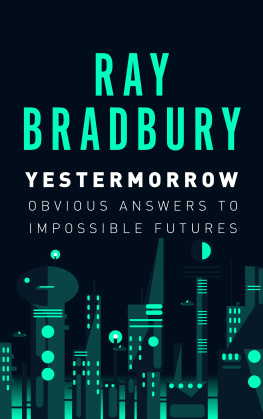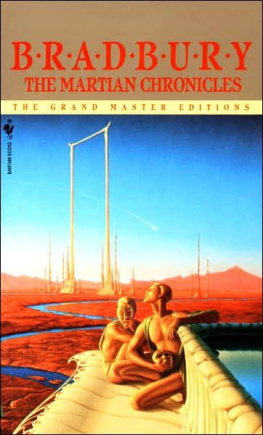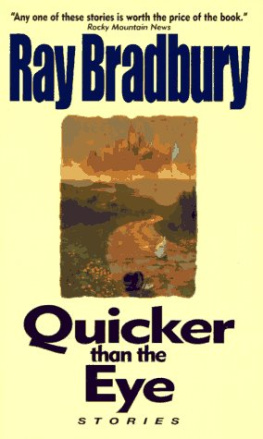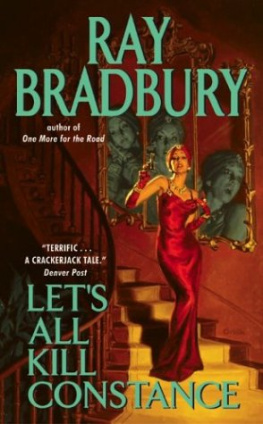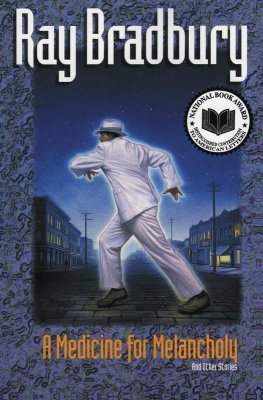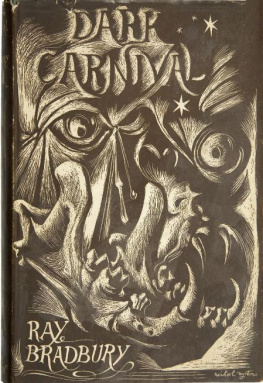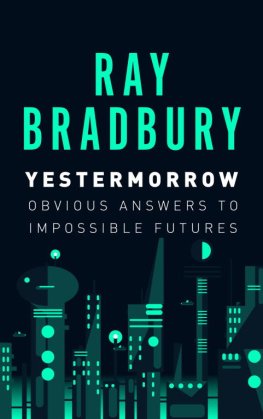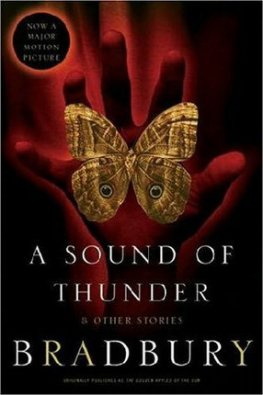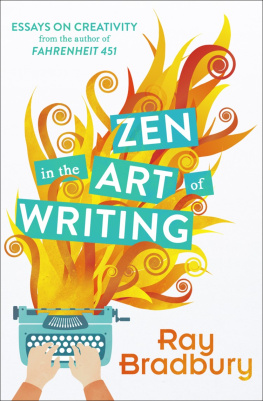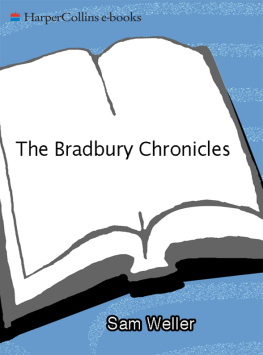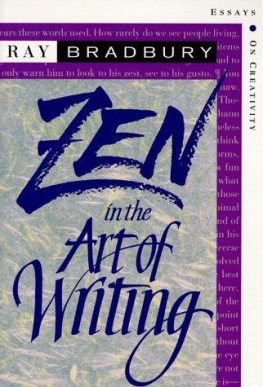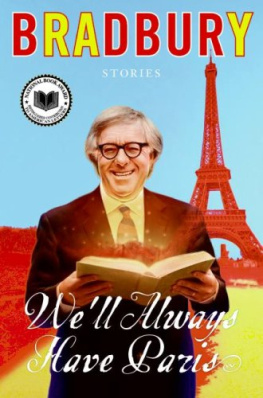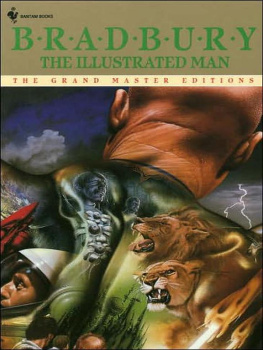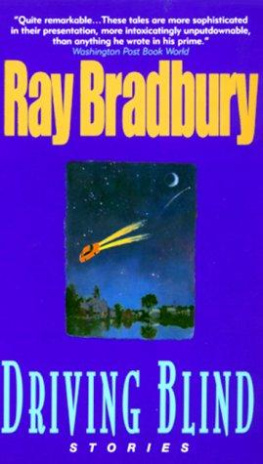Contents
Pagebreaks of the print version
Guide
YESTERMORROW
Obvious Answers To Impossible Futures
Ray Bradbury

New York, 2017
Yestermorrow
Copyright 1991 by Ray Bradbury Enterprises
All rights reserved. No part of this book may be used or reproduced in any form or by any electronic or mechanical means, including information storage and retrieval systems, without permission in writing from the publisher, except by a reviewer who may quote brief passages in a review.
Electronic edition published 2017 by RosettaBooks
Cover design by Christian Fuenfhausen
ISBN (EPUB): 9780795350498
ISBN (Kindle): 9780795350504
www.RosettaBooks.com
For
WALT DISNEY
who started me on this
journey when I was seven,
and to
all the others who helped me
continue the journey at Disney Imagineering:
ROY DISNEY JR., JOHN HENCH, JOHN DECUIR JR.,
MARTY SKLAR, VAN ROMANS, MARC DAVIS ,
and TIM DELANEY .
and
JON JERDE
who convinced me, late in life,
that I was some sort of
creative consultant,
and
JODY GREENWALD
who dropped me on wires down out
of the Shubert Theater flies to
land me in a world of Designers,
and
CAROL SOUCEK KING
and WALTON BROWN
who caught me and tossed me
into the pages of Designers West,
to all, my gratitude and love
YESTERMORROW
The Voyage to Far Metaphor and Elephant India: A Preface
These essays were written mostly under the drunken influence of my dawn voices, my theater of morning, as I call it.
Any owner of cats will know of what I speak. Cats come at dawn to sit on your bed. They may not nip your nose or inhale your breath or make a sound. They simply sit there and stare at you until you open one eyelid and spy them there about to drop dead for need of feeding.
So it is with ideas. They come silently in the hour of trying to wake up and remember my name. The notions and fancies sit on the edge of my wits, whisper in my ears and then, if I dont rouse, give more than cats give: a good knock in the head, which gets me out and down to my typewriter before the ideas flee or die or both.
In any event, I make the ideas come to me. I do not go to them. I provoke their patience by pretending disregard. This infuriates the latent creature until it is almost raving to be born and once born, nourished.
I subscribe to the Big Bang theory.
Which is to say that if there isnt one Big Bang each day in my life I feel ignored and bereft. If the right side of my brain rolls over and grabs a snooze on my left, I immediately run, jump in a desert pool until the old brain divides in proper halves.
What we have here then in this book is a menu of Big Bangs, which may well be small pippins and stale popcorn to you. What does not fill your mind and propel you to the typewriter, drawing board or computer, may well have filled and driven mine.
My plans for hardware stores, mouse museums, and camera obscura-photo-display-histories of artists and their palettes have been lying there like electric sockets waiting to shock for dozens or scores of years. Im glad I happened to be the one who wet his thumb, shoved it in a creative socket and received a shock. With my hair upended I ran to my typewriter for further jolts. Each shock, each jolt, is recorded herein.
All that being true, what is my background?
Back around my thirteenth or fourteenth Christmas, my folks ruined the day. How? By giving me sweaters, socks, shirts, and several ties I wanted to hang myself with by the end of that dreadful, dull December morn.
Dont ever do that to me again! I shouted. Toys is what I want, dammit! Toys!
My shout has continued every Yuletide since. I have had to train my wife and four daughters, and all of my friends, to do birthday and Christmas shopping for me only at Toys-R-Us or F.A.O. Schwarz. My basement workshop and my typing office are littered with magic sets, robots, Godzillas, masks, dinosaurs andleapin lizards!an eight-foot-tall Bullwinkle that used to stand in the window of the Rocky and Bullwinkle Emporium on Sunset Boulevard.
One of my closest friends is Stan Freberg, Americas greatest non-stop humorist. When I murmured Xanadu! on entering his palatial home for the first time, he ran down in the basement and ran back up with a sled on which ROSEBUD was painted in great flourishes.
My first stories, at age twelve, were written on a toy. One of those tin dial typewriters with a circular, rotating alphabet that you turn and press down, taking roughly half an hour to do one or two paragraphs. But rotate, press, rotate, press I did, and writer I became.
How come this madness, early and late, for toys? Because I early-on sensed that they, like poetry, were essences of things, compacted symbols of possible or impossible lives. In sum, I absolutely knew that metaphor was all and everything! Metaphors for breakfast, by God. Sugar and cream em, spoon em down!
I was reminded again, during the Statue of Liberty celebration, that without metaphor we cannot understand, we cannot comprehend, we cannot know ourselves, or others. The gift of being able to compact experience, life, into convenient packets, is pivotal. Without the gift, we would be a-sea in doubts, and miscomprehensions. With it, we know who we are, and can tell one another, hoping that it is true. To sense, to know, to say at the age of twelve or twenty: I am a writer, I am an artist, I am an actor. Not maybe or hope to be, but I am right now!
My gift, if I have one, is on occasion to sit in with groups, sometimes with museums, sometimes with corporations, to tell them who they are. To, in effect, solve their puzzlements, find their metaphor. Sometimes they know it all along, of course. Most of the time, in fact, they have a generalized sense of their aims. But often they have been so busy doing what they do, that they cannot easily hang a proper label on themselves. I must come along, then, as an amiable observer to take notes and make sums.
I am, then, the master of the obvious. Once I drum up a label, spell them their metaphor, everyone says, Of course! Good Lord, thats exactly what we are! How come we didnt see that? Or, seeing it, shout it!
Thus my subtitle: Obvious Answers to Impossible Futures. Which means, further, that one of the reasons I enjoy going through a toy factory is that I am surrounded by nothing but metaphors. Celebrations of joyful concepts. Blueprints and dreams extruded forth in three-dimensional form. Which is not to say that all factories are not manufacturing metaphors; they are. A rifle, or a cannon, is a metaphor for men throwing rocks. What started out at the mouths of caves, extended itself more violently in mens heads, and then into machine shops and ammunition powder mills, where the art of throwing things refined itself. So a few feet or a few yards became a thousand yards or five miles. But the dream of the distance and the energy needed had to come first. The unborn metaphor.
A computer factory is a metaphor for a new kind of library, is it not? True, computers do not look like books, but that is what they are; mechanical folios that hide symbols in their electronic brains and print them forth when we need books, very small or very large.

